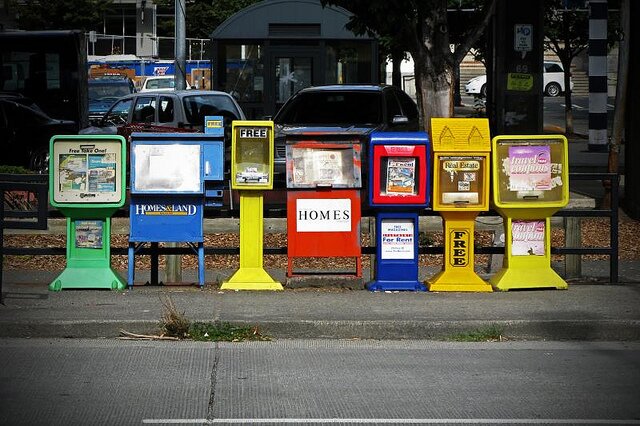Economy Exerts “Downward Pressure” on King County Real Estate Prices

"FREE HOMES" (Photo: Photocoyote in our Flickr pool)
The health of the home real estate market correlates strongly with people’s ability to pay their mortgages, so it’s not surprising that three years of chronic unemployment have done little to improve local listings: “King County median home price falls by double digits again,” Eric Pryne tells you in the Seattle Times. As a case in free fall, here’s a top-floor unit in a 1924 brick co-op condo at 13th and Cherry going for $79,900…somewhat less than its original listing of $184,900. (HOA $446, property tax $1,171.)
There are two tiers of homeowners to be concerned with here, the most obvious being those whose foreclosures provide a stream of distressed properties for the market. But Seattle Bubble’s Tim Ellis notes that there’s a larger group now caught in a kind of paralysis:
Most would-be sellers are not “wary of the market.” They’re stuck in their homes. They’ve been “priced in” and simply couldn’t sell even if they wanted to, because they’ve got no equity, can’t afford to take the loss, and aren’t likely to get their lender to approve a short sale.
This situation exerts a negative effect twice, in that the longer they’re locked out of selling, the longer these owners will go before buying their next home.
That doesn’t mean nothing at all is selling, however. Some deals are too good to pass up, Redfin selected the luxury home market as a little ray of sunshine in 2011: “Luxury Real Estate in King County Kept Buyers Smiling in 2011.” Properties going for over $3 million sold at a rate of almost five per month in King County in 2011. (As it happens, The SunBreak’s zip code, 98112, saw the “most $3 million+ sales in 2011.” Thank you.)
That doesn’t suggest that high-end sellers were getting the original prices they were asking, either–just that people who have money are in a better position to take advantage of a good price. Pryne quotes Tony Hettler, owner of John L. Scott Real Estate offices south of Seattle, saying that there’s been a “huge drag on what I refer to as real-people sales.”
Distressed prices have brought out bargain-hunting investors, but that pool of buyers is necessarily smaller than that of people who are shopping for their own home. (It’s more difficult to buy distressed properties, and because these are often not in “move-in” condition, they can require an additional investment of time and money to make them habitable.)
King County is seeing increased sales percentages, comparatively, because the inventory of homes is less than it would be, if everyone who wanted to sell were free to. Banks are no more interested than underwater homeowners in dumping properties onto this market, even though you could argue that pre-bubble sanity has returned to home prices, and it’s time to sell to eager buyers.
Let’s check back in spring, then.
 Daily Email Digest of The SunBreak
Daily Email Digest of The SunBreak